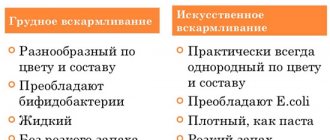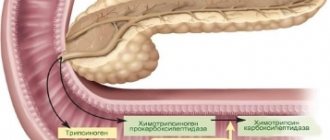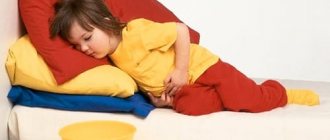Causes of diarrhea without fever
So you need to understand the causes of diarrhea, best of all with the help of a pediatrician, and then begin to treat with safe and effective means for this clinical case.
The immediate causes of diarrhea without fever in children aged 2 years are most often:
- Increased peristalsis is a contraction of the walls of the large intestine, which is why water does not have time to be absorbed into the blood. From the small intestine to the large intestine, food gruel enters in a highly diluted form. And not only when the baby ate soup or drank a lot. During digestion, all digestive juices: saliva, gastric, pancreatic, intestinal juices, bile are released in large volumes, and all this liquid in the large intestine must be absorbed back into the blood. With accelerated peristalsis, this does not have time to happen.
- Inflammation of the mucous membrane of the final sections of the digestive tract due to dysentery, cholera, rotavirus, salmonellosis, botulism and other food infections. But in this case, diarrhea in children aged 2 years rarely occurs without fever.
- Impaired absorption of water and nutrients due to too much volume or inappropriate composition of food for a 2-year-old child.
But all these changes in the body of a 2-year-old baby are preceded by some actions:
- his own,
- parents or other people caring for the child,
- sometimes even doctors.
Let's find out what reasons can lead to diarrhea without hyperthermia at this age and what to do in such cases!
Causes of diarrhea in children 2 years old without fever and what to do about it
| Cause | Features of diarrhea and other symptoms | What to do and how to treat? |
| Bacterial or viral infection (without fever they are extremely rare and only in the early stages). |
|
|
| After treatment with antibiotics: the beginning of the development of dysbiosis. |
|
|
| Functional disorder of the digestive system: accelerated intestinal motility, lack of bile components or enzymes. |
|
|
| Allergic reaction to any food product. |
|
|
| Stressful situation |
|
|
Treatment
Treatment of diarrhea with watery stools should be discussed with your doctor. You cannot take medications and traditional medicine recipes on your own. This will have the opposite effect and instead of relief, the child’s condition will worsen.
Medications
You will need to help the child’s body cope with the root cause of diarrhea:
- Sorbents. Drugs aimed at removing toxic toxic substances from the intestinal tract. If diarrhea occurs due to intestinal infections, poisoning with poor-quality food, or other types of poisoning, the doctor prescribes Smecta, Enterosgel, activated carbon, Atoxil. Smecta contains clay rich in calcium, silicon and magnesium. The medicine absorbs harmful substances, excess water and helps stop loose stools.
- Enzymes. Medicines containing enzyme compounds necessary for normal functioning, replenishing the lack of the body’s own reserves. Mezim, Pancreatin are medications prescribed to children from 6 months of age.
- With diarrhea, not only beneficial bacteria are washed out of the digestive organs, but also vitamins and microelements necessary for the functioning of the system. To prevent devastation, medications Imodium and Loperamide are prescribed. The active action is aimed at reducing motor activity in the intestinal tract.
- When taking antibiotics, probiotic preparations Linex and Enterol are mandatory. Enterol helps in the fight against viruses, bacteria, fungi and parasites. In this case, the effect of the drug is aimed exclusively at eliminating diarrhea, there is no effect on the microflora. Linex is a broad-spectrum probiotic. Prescribed to children of all ages, from birth. Does not affect the beneficial intestinal microflora, helps to gently eliminate diarrhea.
Folk remedies
The following are offered as traditional medicine recipes for quickly getting rid of diarrhea:
- A decoction of fennel, oak and sage. Mix in equal proportions. Add 1 tablespoon of the mixture to 1 liter of boiling water. Boil over low heat for 30 minutes. Cool and strain through cheesecloth. 3 times a day, 100 ml of decoction.
- Rinse a spoonful of rice under running water. Boil water and add rice there. Cook for 40 minutes. The resulting solution is passed through a finely perforated sieve. Rice water helps stop diarrhea that occurs for any reason, thanks to the substance it contains to strengthen the stool.
- Blueberry jelly is very tasty. Children eat the dish with pleasure. A spoonful of starch is dissolved in 100 ml of water and gradually added to boiling water. Berries were added there first. To ensure that there are no lumps left in the jelly, you will need to stir it all the time. 15 minutes after adding starch, the jelly is ready.
How to deal with dehydration?
Dehydration can only be treated with water. After each bowel movement and in the intervals between them, you need to drink water in small portions, but often. The liquid should be at a temperature of 36-37℃, that is, the same as body temperature. In this case, absorption will occur as quickly as possible. It is better if there is a weak saline solution, since salt retains fluid in the body. It could be:
- regular boiled or bottled water without gases,
- solutions of pharmaceutical preparations Regidron, Glucosan,
- self-prepared solution of table salt: a teaspoon per liter of boiled water.
Do I need to call an ambulance?
If a temperature appears with intestinal symptoms such as vomiting, diarrhea, nausea and abdominal pain, then you definitely need to call a doctor, and if he cannot come quickly, then an ambulance. But what if a 2-year-old child develops diarrhea without fever? Here the issue of emergency medical care is resolved positively in the following cases:
- when children do not get better for more than 2 days;
- if it is known that the child ate mushrooms or spoiled foods, and also got hold of some unattended pills,
- if there is blood in the stool or vomit,
- with severe abdominal pain,
- blurred vision, problems with swallowing and speech, which may be signs of botulism,
- if the child is weak, lethargic and pale, especially if this is accompanied by a noticeable drop in temperature.
In all other cases, if the child is under 3 years old, you just need to contact your local pediatrician, and not wait until it gets worse.
Please note that if you have severe abdominal pain, you should not give painkillers without a doctor’s prescription.
The term "acute abdomen" suggests that there is severe inflammation or damage to an internal organ in the abdominal cavity, and pain medication may interfere with rapid diagnosis and emergency care. It can reassure parents at a time when they should be sounding the alarm and urgently rescuing the child.
Types of watery diarrhea in children
Watery diarrhea is divided into types depending on the shade of stool, on the basis of which the diagnosis is established:
- Green color indicates intoxication of the body by pathogenic microorganisms (viruses, E. coli, etc.). Greening of stool occurs due to the influence of toxic substances that are released by bacteria during their life processes. Read more about the causes of green diarrhea in a child here.
- White diarrhea indicates problems with the liver.
- Yellow watery diarrhea is considered the safest, as it is caused by immature digestion in newborns. If yellow feces occur at an older age, this indicates a mild degree of food poisoning or an allergic reaction. Find more information about the nature of yellow diarrhea here.
- The color ranges from burgundy-dark to black - the most dangerous, as the cause may be internal bleeding.
Diarrhea for no reason and how to understand that the child is healthy?
Obviously, diarrhea in a 2-year-old child without fever cannot appear without a reason. It is very important to find out this reason in time, which requires consultation with a general pediatrician or a more specialized specialist. And then it will be clear what to do and how to treat.
But keep in mind that diarrhea is considered to be loose stool repeated more than 2-3 times; if this happens once, then you should not scare yourself and your child.
Maybe he just drank too much juice. If the next bowel movement is of normal consistency and there are no other symptoms, then calm down - your baby is healthy.
How to treat diarrhea in a child
How to cure diarrhea in a child so that the process is most effective and the disease does not leave consequences? First of all, you need to call a pediatrician at home, who will prescribe medications to treat diarrhea. You also need to understand the reason why the diarrhea started. If loose stools are affected by disruptions in the diet, then you need to adjust the child’s menu. The baby should be given a drinking regimen and given anti-diarrhea medications (activated carbon, smecta, enterosgel). When treating diarrhea, it is necessary to monitor the general condition of the baby, his temperature; if it increases, the child should be given an antipyretic drug. The picture is slightly different for diarrhea caused by infection or poisoning. In this case, at first there is no need to fasten the intestines, since with the help of loose stools the body gets rid of toxins. It is necessary to give the baby water and monitor his condition.
For diarrhea, the following groups of medications are prescribed:
- Enterosorbents relieve intoxication and strengthen the intestines.
- Probiotics are a complex of beneficial bacteria that improve the condition of a child’s gastrointestinal tract with dysbacteriosis.
- Antimicrobial medications - get rid of the causative agent of diarrhea of viral etiology, and also slow down intestinal motility.
Prescribing antibiotics for diarrhea is not always useful, since their aggressive effect on the intestinal microflora can aggravate the situation.











